
views
- Measure the space for the flower wall and buy foam board, that matches the dimensions. For a full-size backdrop, try 8 ft × 8 ft (2.4 m × 2.4 m) or larger.
- Trim the faux flower stems and hot glue the blooms to the wall backing in your preferred arrangement or design.
- Mount the flower wall to an actual wall with Velcro strips. For a free-standing, portable option, mount the flower wall to a backdrop stand.
Creating the Wall Backing
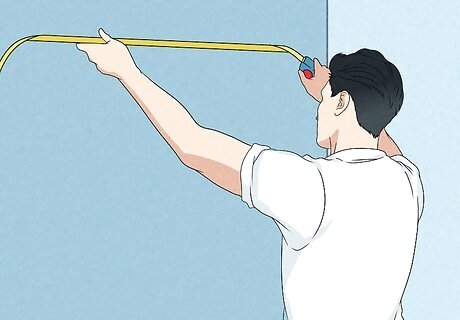
Measure the space where the flower wall will go. Use a tape measure to get the length and width of the area. If you’re certain the venue or space has high ceilings and a long wall to work with, you don’t necessarily need to measure the space first. If you aren’t sure, it’s best to measure and double-check. 8 ft × 8 ft (2.4 m × 2.4 m) is a good size if you're using the flower wall as a backdrop for your wedding altar. It’s also perfect if you intend to use it as a backdrop for pictures.

Buy multiple pieces of foam board to match the dimensions you need. It’s important to work with separate pieces of foam board, especially if you're making a full-size flower wall backdrop. That way, you can easily transport the wall to the venue. Separate pieces are also much lighter and easier to hang. For example, for an 8 ft × 8 ft (2.4 m × 2.4 m) flower wall, buy two pieces of foam board that measure 4 ft × 4 ft (1.2 m × 1.2 m). Alternatively, you could buy four 2 ft × 2 ft (0.61 m × 0.61 m) foam boards. If you can’t find foam boards that add up to your specific dimensions, go a little bigger and then trim the boards down to size. You can buy foam board at office supply stores, as well as craft and home improvement stores. If you don’t want to use foam board, you could also use a sturdy fabric (like canvas) to create the wall backing.
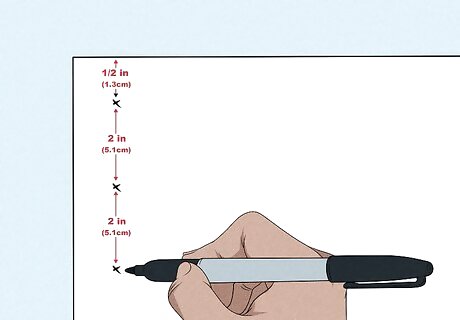
Use a marker to mark dots about 2 in (5.1 cm) apart on the board. Start ⁄2 in (1.3 cm) from the top edge of the board. Make the first dot, move down 2 in (5.1 cm), and mark the next dot. Repeat all the way down to create the first column. Move over 2 in (5.1 cm) to start the next column. Make the first dot 1 1/2 in (3.8 cm) from the top of the board. Continue making dots 2 in (5.1 cm) apart all the way down. Move to the next column and make the first dot ⁄2 in (1.3 cm) from the top, with the rest of the dots in the column 2 in (5.1 cm) apart. Keep alternating until you get to the other side of the board. Staggering the column spacing ensures an even, full-coverage look.
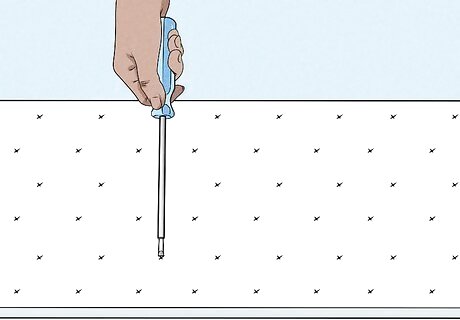
Use a screwdriver or ice pick to puncture each dot on the board. Hold the tool over each dot and apply a small amount of pressure to punch a small hole through the foam. Puncturing the foam creates a tiny “seat” for each flower. If you’re using fabric instead of foam board, don’t worry about creating holes. You can hot glue each bloom directly to the fabric.
Adding the Flowers
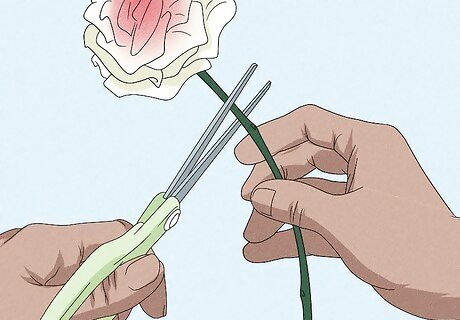
Trim the stems and separate the faux flowers into piles by size and color. If you’re using stemless faux flowers, don’t worry about trimming the stems (the stems will already be trimmed to very short nubs that fit perfectly in the foam holes). Otherwise, trim each stem to match the thickness of foam board. Then, sort them into piles to get organized. For example, if your foam board is 1 in (2.5 cm) thick, trim each stem to be about 1 in (2.5 cm) long. Use any flower colors and types that you’d like, but try to limit yourself to 2-4 colors so the wall doesn’t look too busy. If the wall is for a wedding, consider using the same flowers for your wall and bouquets for a cohesive feel. Faux flowers work best for several reasons. It would be very expensive to use real flowers, but the main issue is keeping the flowers fresh for the event. Once the flowers are placed on the wall, they won't have access to water and can't be refrigerated (so they'll wilt quickly). If you’re using fabric instead of foam board, trim each stem down to a nub so that all that's really left is the bloom itself and the green piece underneath holding the petals together.
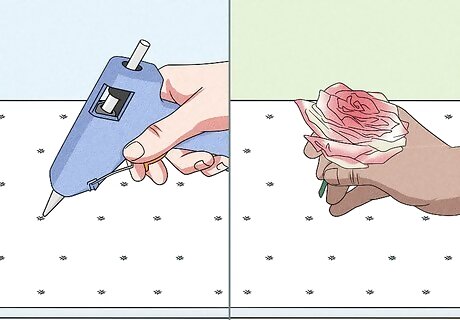
Put a dot of hot glue in the hole and nestle the flower in stem-side down. If you aren’t sure what look you’re going for, arrange the flowers on top of the board to your liking first. Once you're happy with the look, use a hot glue gun to secure the flowers into place. Just nestle the short stem into the hole and wait 30 seconds for the glue can set. You don't need to fill the hole all the way up with hot glue since it might pool on the backside of the foam. Just place a dot of glue in the hole and push the stem through.
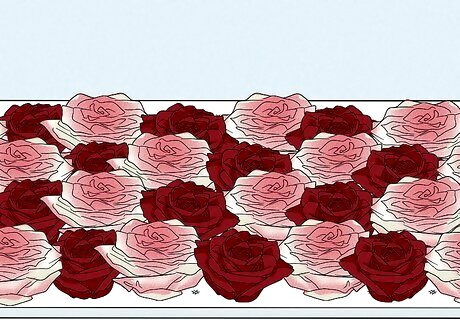
Alternate the flower colors, sizes, and shapes as you place them. The overall design is entirely up to you, so feel free to use your imagination! In general, you'll want to alternate different flowers/colors so they're evenly spaced out. That way, the finished look is natural and balanced. For example, avoid clumping a bunch of large red flowers in the top right corner and small white blooms in the bottom left. This creates an unbalanced, awkward look.

Fill in any sparse areas with flowers or greenery. Once you fill all the holes on the board, take a step back and inspect your handiwork. If any areas look thin, puncture new holes and add more flowers to the wall, as needed, to bulk them up. For a playful or whimsical look, consider adding trailing greenery, like vines, and letting the pieces dangle from the board.
Mounting the Flower Wall
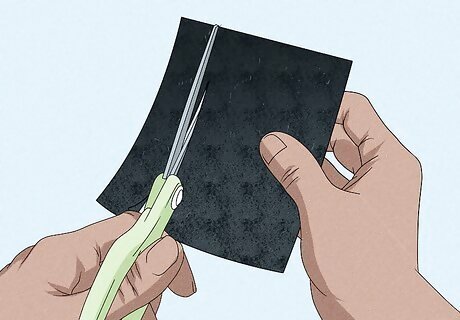
Use double-sided Velcro strips to hang the flower wall. Faux flowers are lightweight, so Velcro strips can easily handle the weight of each board. Cut strips that are 4–5 in (10–13 cm) long. Flip the wall over to the backside and place a Velcro strip vertically in each corner. Add a few more strips in the center of the board so the mount is secure. Then, place the other side of each Velcro strip directly to the wall, lining them up with the placement on the foam. Press the foam backing against the wall firmly so the Velcro pieces line up and attach to each other.
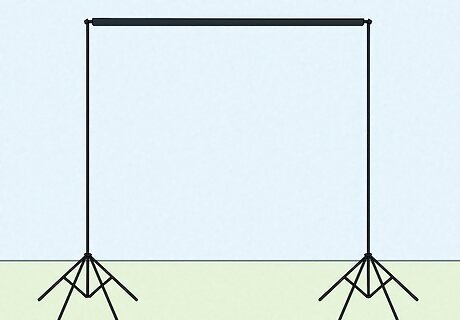
Use a backdrop stand if you need a free-standing and portable option. A backdrop stand works great if you want your flower wall to be outside, or if you don’t have an available wall inside your venue. If your venue has rules or restrictions about hanging things directly on the walls, a backdrop stand is the perfect solution. Follow the directions to assemble the stand and use the clips that came with it to mount the flower wall.

Make any final adjustments necessary so the flower wall is secure. Make sure the wall is mounted securely. If the wall feels at all wobbly, add a few more pieces of Velcro or use more clips for a firmer grip. If you're outdoors, add weights or sandbags to the bottom sides of the stand (behind the flower wall), so the stand doesn't budge. If you used a backdrop stand, you may need to reinforce the center of the backdrop (since the foam board is in separate pieces). Use extra clips and/or hot glue the boards side-by-side for security.

















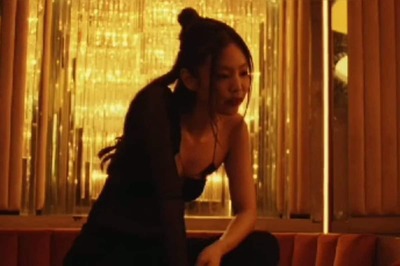


Comments
0 comment